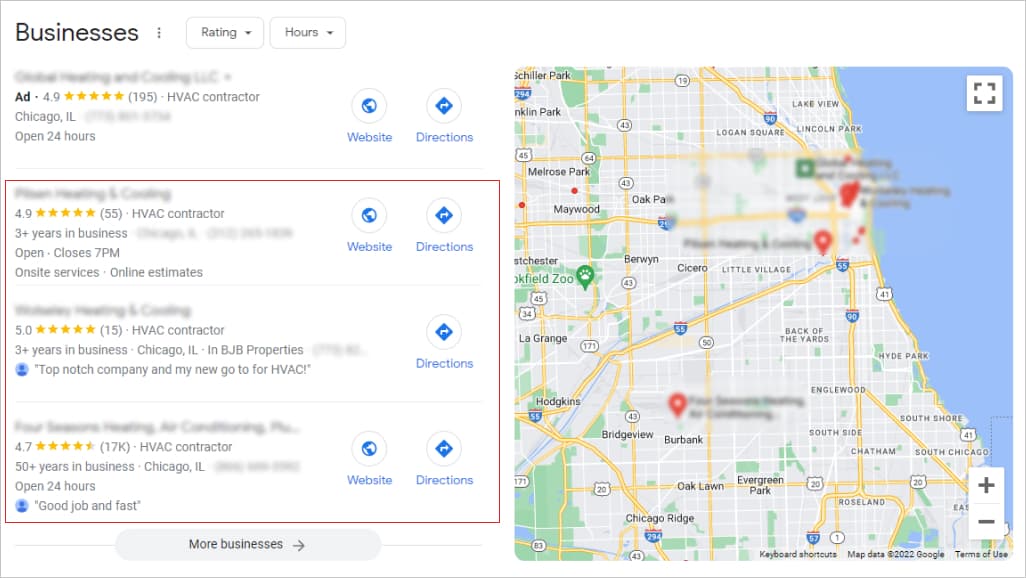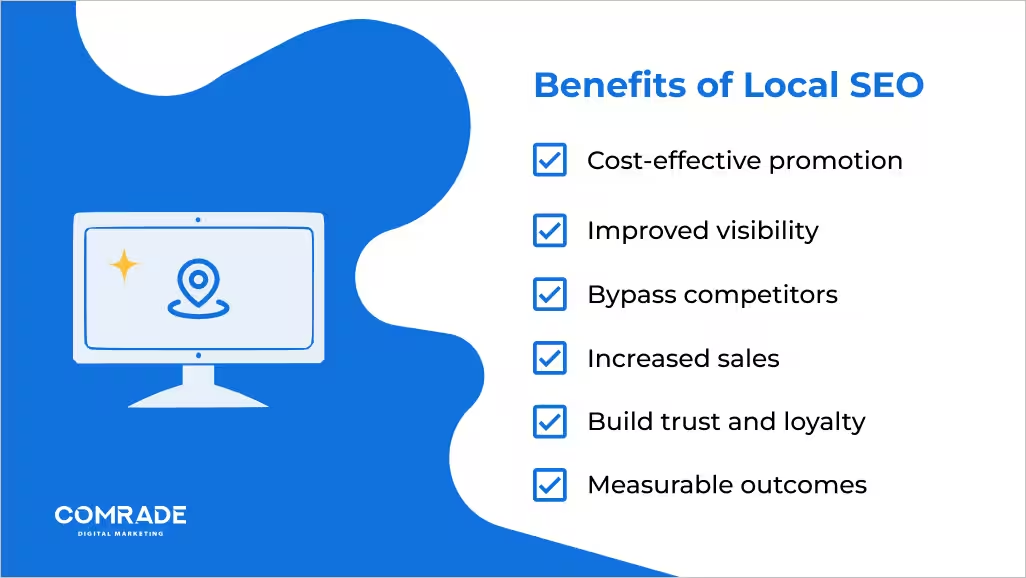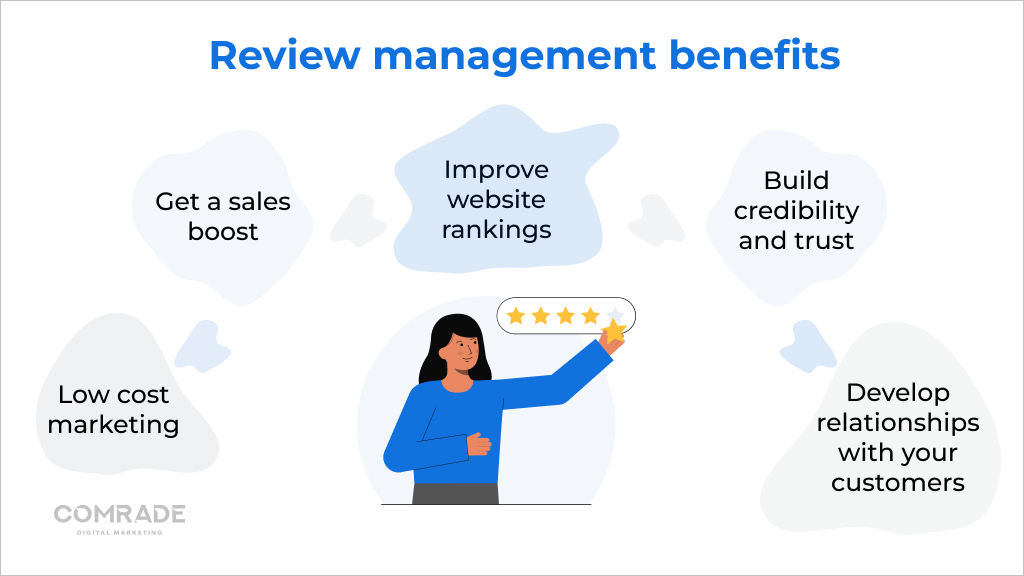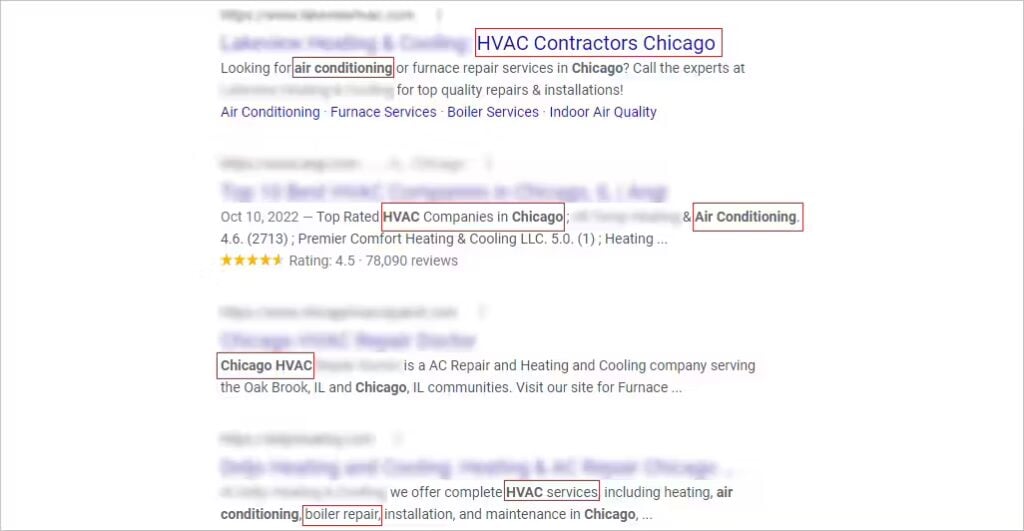When most people’s HVAC systems stop working, they whip out their smartphones and Google Search for an HVAC company nearby. The first company to pop up with good reviews will likely get the job.
Unsure of what local SEO for HVAC is? Basically, it’s the process of making sure your company is the first one people call when they search for the services you offer online. Local search engine optimization promotes online discoverability, increased traffic, more sales, and decent ROI.
If you’re a large HVAC franchise, small company, or independent HVAC contractor working in specific or in multiple locations, then you need local SEO to boost your business. In this blog, we explain its benefits and go over some tactics to improve your rankings on local search engine results pages.
What Is HVAC Local SEO?
HVAC local SEO is the process of optimizing your website for search engines to rank higher for specific geographic regions you serve. Specifically, it targets Google 3-Pack rankings with your Google Business Profile, as well as local organic searches.

The Google 3-Pack is what it sounds like: A pack of three local search results that appear at the top of local searches. They are deemed the most relevant, prominent, and close in proximity to the user.
The Google 3-pack displays information such as site links, ratings, reviews, contact information, pictures, etc. A map also appears above the listings, which connects directly to Google Maps and pinpoints the area of every business listed.
Why Do HVAC Businesses Need Local SEO
Generic HVAC keywords may attract online traffic, but they are exceptionally competitive and don’t lead to better conversions. Yet, with local SEO for HVAC, you can directly target customers who require your services, i.e., qualified leads.
For example, let’s say you’re based in Los Angeles, Long Beach. Clients in that area will probably use keywords like, “HVAC company near me,” “HVAC company Long Beach,” “fix HVAC Long Beach,” and so on.
Can you see how important optimizing for local keywords is? If you don’t, potential clients won’t know you exist.
Ready to take your HVAC business to new heights? Explore our top SEO tips tailored for your industry and start growing your online visibility today.
The Benefits of Local SEO for HVAC Companies

Besides matching with users’ search intent, a local SEO strategy also offers the following advantages:
- Cost-effective promotion: An HVAC SEO strategy is cost-effective because it targets users who are actively looking for your products and services. SEO’s inbound nature saves money, unlike outbound strategies such as cold-calling.
- Improved visibility: With proper SEO, your HVAC website will appear on SERPs every time a user searches online. The more this happens, the more clients will recognize your company.
- Bypass competitors: It’s difficult to beat competitors for high-value keywords like “HVAC services.” However, you can outrank them for local search terms like “HVAC services in X city,” even if you don’t show up in the first 100 results for broader search terms.
- Increased sales: 80% of local searches convert, so if a lead finds you online and clicks through to your website or calls you, there’s a big chance they’ll become a client.
- Build trust and loyalty: Generating online reviews is a core strategy of local SEO. When you have many positive reviews, customers will naturally trust you more.
- Measurable outcomes: Local SEO is measurable. With the right analytics tools, you can tweak your internet marketing strategy and improve your bottom line. There’s no guessing, just strategy informed by data, which guarantees results.
7 Best Local SEO Tactics for HVAC Companies
Local SEO is essential as more and more people perform searches on their smartphones to find HVAC service providers nearby. Below are a few tactics to help your HVAC company to appear at the top of local results.
1. Google My Business for HVAC Service Providers
Google My Business (GMB) is a free tool that promotes positive local search engine optimization (SEO) practices, so your HVAC company can get noticed on Google. The purpose of GMB is to make important business information easily accessible, have it show up on Google Maps, and receive business reviews.
Without a GMB profile, it’s unlikely your company will show up on Google Maps and the local pack. So, if a potential client searches online, they won’t find you. To give your business optimal visibility, you need to register a GMB and then:
- Claim your listing
- Fully populate your profile
- Keep your hours updated
- Choose the right business categories
- Select all applicable attributes
- Verify your location
- Add photos
- Gather reviews
2. NAPs for HVAC Companies
NAP stands for “name, address, and phone number.” Part of implementing a local SEO strategy includes populating online directories with your NAP details, which you have to fill out on your GMB profile as well. Despite its simplicity, having a consistent NAP is essential for Google’s local search and Local Pack algorithms.
For instance, if your business is located in Bloomingdale Street, but your NAP details flip-flop between “Bloomingdale St.” and “Bloomingdale Street,” Google won’t necessarily associate “st.” with your business because it’s not the same as “street.”
Google will question the legitimacy and reliability of your HVAC business and drop it lower in search engine results pages. Additionally, research has revealed that 80% of consumers are confused by and also distrust inconsistent NAP data.
3. Review Management for HVAC Businesses
Reviews provide customers with the necessary social proof to convince them to buy products and services. Actively gathering, monitoring, and responding to reviews improves customer experience and local SEO.

Sure there are numerous factors involved in Google rankings; however, favorable online customer reviews send a strong signal to search engines that your business website is credible. Moreover, to get into the local pack, you’ll need reviews, as they’re a top-ranking factor.
Quick Tips to Get More Reviews:
- Get into the habit of asking customers to leave reviews on Google.
- You can include a link to your GMB listing with a review request when you send a follow-up email after a service.
- Create a custom short URL, so customers can leave a review in one click. This is perfect for WhatsApp and email communication.
- Ask for reviews at the right time. For instance, if your customers have been doing business with you for a while, or just after a new customer hires or buys products.
Want to work with the best HVAC marketing agencies? Check out our article to find the perfect match for your business.
4. HVAC Local SEO Content
For local SEO strategies to work, it’s important your local content is community-focused. Inserting local keywords within the body copy, title, and meta descriptions can skyrocket local rankings.

Utilizing long-tail keywords is a common search engine optimization strategy to delineate local content, either topically or geographically. For example, your overarching web pages may include “HVAC Services,” while a blog post or landing could include “Best HVAC Services in El Segundo.”
This ensures Google indexes your content for El Segundo and SEO-related searches. We also recommend inserting geographic keywords as close to the beginning of meta tags as possible, so it’s not truncated in search results.
HVAC businesses with multiple locations would do well to have multiple landing pages, curating content specific to each respective area. As for the type of content you create, so long as it contains local keywords and pertains to whichever community you’re serving, that should suffice.
Creating local content doesn’t mean you have to reinvent the wheel. You just have to make it appealing to locals. It’s a simple this: people in two distinct regions may not have the same pain points or speech patterns, and so creating localized content ensures your HVAC company has the best chances of ranking in SERPs when your customer search online.
4.1. Local Keyword Research for HVAC Services
The primary difference between regular keyword research and keyword research is that local keyword research is specific to locations and services. Instead of “HVAC company,” your clients are going to search for “Beverly Hills HVAC company,” or “hire Beverly Hills HVAC company.”
Here’s how to do basic local keyword research:
- List your products and services: This creates your main keyword list you can expand and refine with modifiers such as “how,” “hire,” “buy,” “get a quote,” etc. You’ll want to attach location-specific words to your main keywords like “nearby,” “near me” and the name of the neighborhood, town, or city you service. You can pay around with these variations.
- Check search volumes: Search volume is the estimated number of searches over a specific period for a keyword. A higher volume indicates the keyword is popular. It’s pointless using a keyword no one is interested in.
- Research local competitors: Knowing your competitors’ keywords will help you understand how to approach your local SEO campaign.
- Confirm for local intent: Local intent indicates searchers want to shop nearby. So, if you type in a keyword and there are no local SEO results, then that keyword won’t drive any traffic.
Comrade Digital Marketing Agency can help you with the above if you’re unsure how to go about it. Schedule a free consultation.
5. HVAC Industry Local Directories
Google, and other search engines, use trustworthy directory listings as business “certifications.” The more your NAP details appear in online directories like Yelp, Angi’s, and HomeAdvisor, the more legitimate your business becomes, and the higher it ranks.
Digital directories also share reviews, business comparisons, and more, helping clients make better choices quickly and efficiently. The main purpose of listing your business in local directories is to achieve higher exposure and for local SEO purposes.
Not all directories request the same information, but the following offers a detailed overview of what to include:
- A consistent NAP
- HVAC company description—a brief summary of its mission and values
- Website URL
- Operation hours
- Reviews and star ratings
- Links to relevant social media profiles
- Business category, in terms of industry
- Accepted payment forms
- High-quality images and videos
Want to rank higher for HVAC searches? Learn top HVAC SEO strategies in our article.
6. Google E-A-T
Before E-A-T, Google’s ranking guidelines prioritized keyword placement over the quality of information delivered to searchers. That’s partly why so much misinformation spread on the internet. Now Google evaluates the Expertise, Authoritativeness, and Trustworthiness of a business’s online presence, and how it enhances user experience.
This translates to:
- Expertise: The ability to create original and reliable information on your website and associated marketing material.
- Authoritativeness: Having positive testimonials, reviews, mentions, interviews, etc.
- Trustworthiness: According to Google’s Search Quality Rater’s Guidelines, transparency has to do with providing adequate contact details and customer support information.
If your E-A-T is good, it means your website, and the content on it has top qualities Google is looking for to provide users with the best possible experience. Getting backlinks from websites Google respects, listing your business on trusted directories, and following local SEO best practices are ways you can boost your E-A-T score.
Video marketing for HVAC companies can increase engagement! Discover the best tips in our article—click to read.
7. Local SEO Analytics for HVAC Contractors
To ensure your local SEO is aligned with your overall marketing goals and that your business isn’t missing out on opportunities, you need to monitor and analyze incoming traffic and track your local map pack listing.
Using the right tools like Google Search Console, Google Analytics, BrightLocal, Moz, or Ahrefs makes it easy to monitor the following metrics:
- Organic traffic: The number of visitors who arrive at your site from independent local searches.
- Bounce rates: The percentage of visitors who leave your web pages without taking an action.
- Conversion rates: The number of visitors who complete a desired goal (conversion) out of the total number of people who visit your website and/or GMB profile.
- Target keywords: There are several metrics to track when it comes to keywords, although search volume is the most popular.
- Loading speed: How quickly your content loads when someone visits your pages.
SEO is constantly changing due to user behavior and Google algorithm updates. With this in mind, it’s essential to make sure your construction website and GMB listing are healthy, properly optimized, and producing leads and sales.
Ready to create impactful content? Check out our guide to HVAC content marketing and grow your business.
Rise to the Top of Search Engine Results
Local SEO should be a pillar in your online marketing strategy. Clearly, there are numerous tactics you can use, although getting a Google My Business listing should be your priority. That’s because it’s the first thing that shows up on localized search results.
That being said, if you need assistance, or would rather hire experts, we can get the job done for you.
Comrade Digital Marketing creates tailored local SEO strategies for HVAC companies to improve their visibility in location-related searches. With our services, you’ll increase calls, inquiries, and sales.
As a full-service digital marketing agency and HVAC SEO company, our skilled team can also optimize your website and execute all your HVAC digital marketing. Why not contact us for a free consultation?


